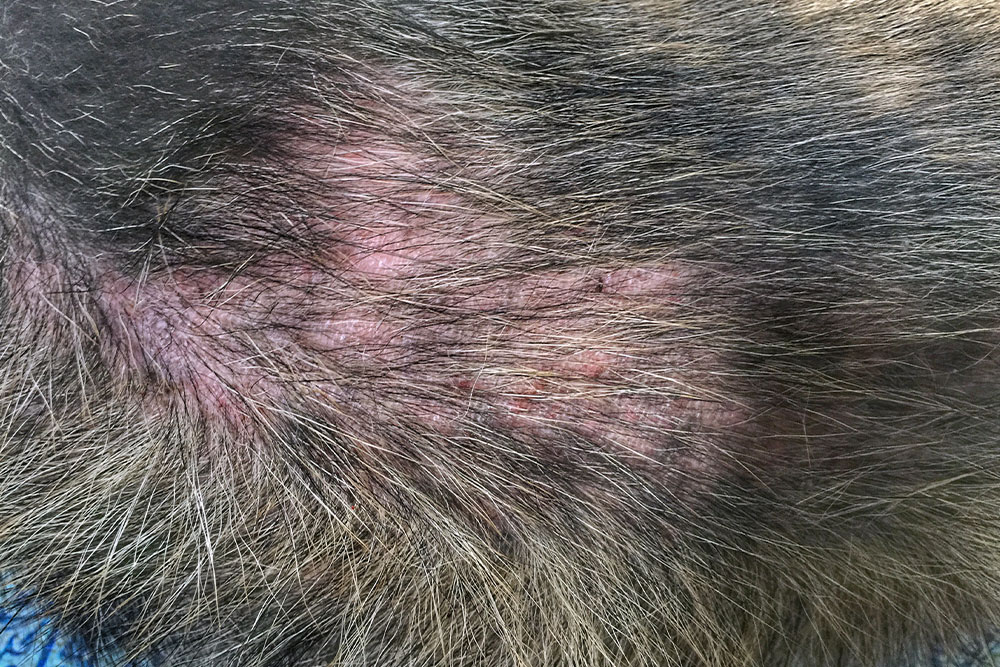When Pet Allergies Become Emergencies: What Every Owner Should Know
It starts out like any other weekend. Maybe your dog trots through a grassy field on your morning walk, only to have chewed a painful hot spot by lunchtime. A single flea hops on at the park and, by nightfall, your pet is frantically pulling out fur in a desperate attempt for relief. Ear infections can spiral from mild head shaking into excruciating pain, and scratching may rupture a blood vessel, leaving the ear swollen with an ear hematoma.
Allergies don’t always creep in slowly. Sometimes they strike fast with sudden hives, facial swelling, or even collapse from anaphylaxis. At Mission Veterinary Clinic & Animal Emergency Hospital, we’ve seen every level of allergic disease, from the itchy to the life-threatening. As an AAHA-accredited hospital serving Granada Hills and the San Fernando Valley, we’re equipped for urgent and emergency care when allergies push your pet past their limit.
How Allergies Land Pets in the ER
Allergies are the immune system’s overreaction to harmless triggers like insect stings, pollen, flea saliva, food, or medication. The inflammatory cascade that follows can show up on the skin, in the ears, in the eyes, or systemically throughout the body. While some pets only struggle with chronic itching, others develop sudden, painful, or even dangerous complications that require emergency treatment.
Skin and Ear Complications
- Otitis externa: Allergies are one of the most common underlying causes of ear infections in dogs and cats. Inflammation and secondary infection create swelling, pain, foul odor, and head tilt that can quickly become unbearable. Severe and chronic infections can develop antibiotic resistance and progress to inner ear infections, hearing loss, and even require surgical removal of the ear canal to fix.
- Ear hematomas: When pets shake or scratch intensely, tiny blood vessels in the ear flap can break, filling the pinna with fluid. An ear hematoma is extremely painful and often requires surgery to correct. These hematomas can rupture in your home if your pet continues to shake their head and traumatize the ear flap- while your pet won’t bleed to death from this, it is incredibly messy, painful, and requires immediate treatment.
- Hot spots: Also called pyotraumatic dermatitis, these moist, inflamed lesions can appear in hours after chewing or licking and progress to full-body skin infections. Hot spots are intensely itchy, easily infected, and usually need sedation, clipping, and topical or systemic therapy- plus non-negotiable use of a cone.
- Pododermatitis: Many allergic pets develop inflamed, painful, swollen paws from constant licking and chewing. Severe cases progress to draining tracts between the toes, known as interdigital furunculosis, which can require long-term antibiotics or even surgery. This can be hard to distinguish from foxtail related inflammation, so careful treatment is necessary.
Eye and Respiratory Issues
- Conjunctivitis: Environmental allergens can inflame the eyes, leading to redness, swelling, and discharge. Conjunctivitis in dogs and cats is often caused by allergies. This can be itchy and irritating- use a cone to prevent rubbing of the face.
- Corneal ulcers: Itchy eyes may cause pets to paw or rub their face with paws, on furniture, or on the ground, scratching the cornea and causing corneal ulcers. These are extremely painful and can threaten vision if untreated. Any squinting, excessive tearing or discharge, change of color or opacity to the surface of the eye, or eye pain should be seen right away, as these can get worse quickly.
- Respiratory distress: Allergic airway inflammation may present as reverse sneezing, wheezing, or labored breathing. In severe cases, airway swelling can mimic asthma or progress to full anaphylaxis.
Systemic Reactions (Anaphylaxis)
- Insect stings, medications, or foods can trigger a whole body over-reaction. Sudden collapse, vomiting, pale gums, facial swelling, and/or airway obstruction can occur. These systemic reactions are true emergencies requiring epinephrine, IV fluids, and hospitalization.
Why Quick Action Matters
Mild allergy symptoms may not seem urgent at first, but the progression is often rapid. An itchy ear can become a ruptured eardrum, paw licking can evolve into infected pododermatitis, and hives can turn into anaphylaxis. Prompt treatment prevents chronic pain, secondary infections, and life-threatening complications.
Emergency Symptoms- Don’t Wait
Anaphylaxis happens fast and can get worse rapidly.
- Sudden facial swelling or hives
- Wheezing, choking, or open-mouth breathing
- Vomiting, diarrhea, or collapse
- Seizures, unresponsiveness, or collapse
Eye issues can progress to blindness quickly.
- Eye pain, squinting, or severe pawing at the face and eyes
Intense itching causing pain and infection in a matter of hours. Ear infections are deeply uncomfortable. While not an emergency, these problems should be seen urgently.
What to Expect at Mission Vet
We use a triage-based walk-in system, ensuring the most critical patients are seen first. When your pet arrives, our team immediately evaluates vital signs, airway, and circulation. Depending on severity, care may include:
- A complete medical history and review of exposures
- Full physical exam, with more in-depth eye and ear exams if needed
- Diagnostics: ear and skin cytology , bloodwork, allergy testing, or imaging
- Sedation, clipping, cleaning, and bandaging of wounds or hot spots
- Emergency stabilization with oxygen, fluids, or epinephrine as needed. Continuous monitoring with overnight hospitalization may be recommended.
- Administration of medications to help with pain, itchiness, infection, or inflammation
Please call before you arrive so we can prepare or direct you if capacity is reached.
Building a Long-Term Plan to Prevent Emergencies
The best way to avoid late-night ER visits is by managing allergies proactively. Not every allergic episode sends pets into immediate crisis, but even “milder” flares can be miserable. Long-term strategies focus on reducing flare-ups before they spiral into emergencies:
- Topical therapy as routine care: Regular baths, sprays, wipes, medicated rinses, and leave-on mousses keep allergens off the skin and reduce the cycle of itching and infection.
- Long-acting allergy medications: Options like Apoquel or Cytopoint help control itching day-to-day and dramatically decrease the risk of secondary complications like ear hematomas or severe hot spots.
- Immunotherapy: Custom allergy drops or injections retrain the immune system to tolerate triggers, offering one of the only long-term solutions.
- Nutritional support: Prescription or hydrolyzed diets can identify and eliminate food allergens while strengthening the skin barrier.
- Year-round parasite prevention: Protects against flea saliva, one of the most common and severe allergy triggers
- Dermatology and allergy consultations: For pets with stubborn or chronic flare-ups, ongoing specialty care provides tailored strategies that reduce the need for emergency visits.
- Use the cone. An e-collar (cone) should be a key part of your pet first aid kit, and needs to be long enough so your pet cannot reach their toes to lick. Put it on at the first sign of symptoms.
By focusing on prevention, we not only keep pets more comfortable day-to-day but also protect them from the painful and sometimes life-threatening complications that bring families rushing to urgent care.
Turn Allergy Emergencies Into Recovery
Allergies may start with an itch, but they can quickly turn into something much more serious. Whether it’s a hot spot that spreads overnight, an ear infection that leaves your pet in agony, or a sudden episode of anaphylaxis, timely treatment is the difference between misery and recovery.
Mission Veterinary Clinic is open for emergency and urgent care 365 days a year. We operate on a triage-based system and may close if capacity is reached, so always call ahead at (747) 800-5706 or check our contact page for current hours.
Address
16915 San Fernando Mission Blvd
Granada Hills, CA 91344
Emergency Hours
Open daily at 9:00 AM
Close the following morning at 6:00 AM (except Wed/Thurs at 11:30 PM)
See full services and hours
At Mission Veterinary Clinic, we don’t just treat the crisis. We help you build a plan to prevent the next one. With immediate stabilization, advanced diagnostics, and long-term allergy management, our team is here to give your pet relief today and resilience for tomorrow. If your pet is struggling- or you’re not sure- call us right away.











Leave A Comment